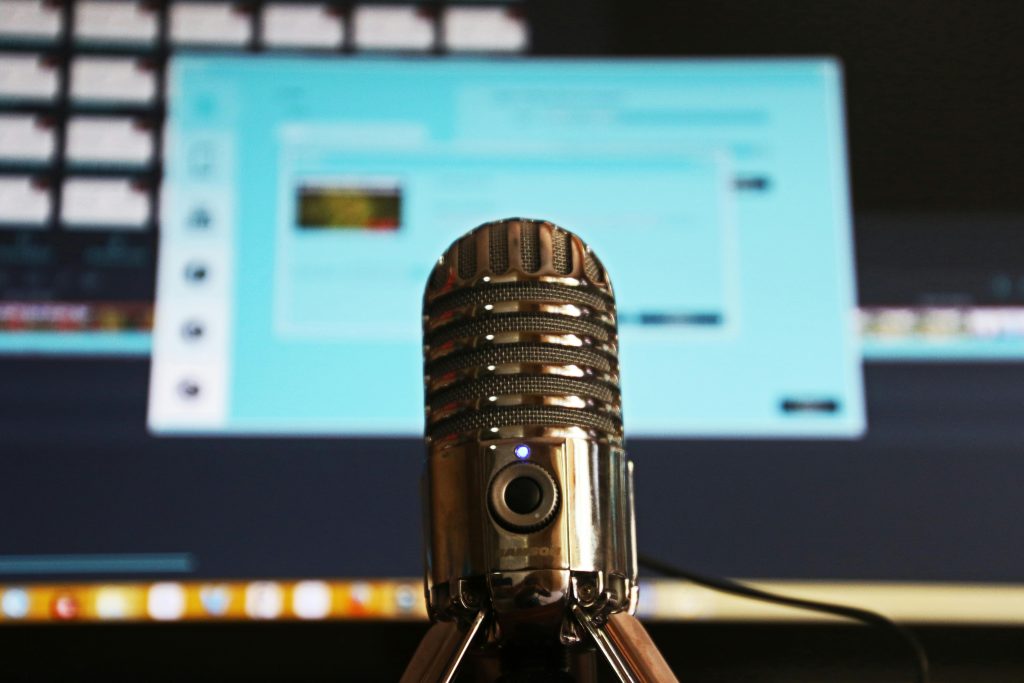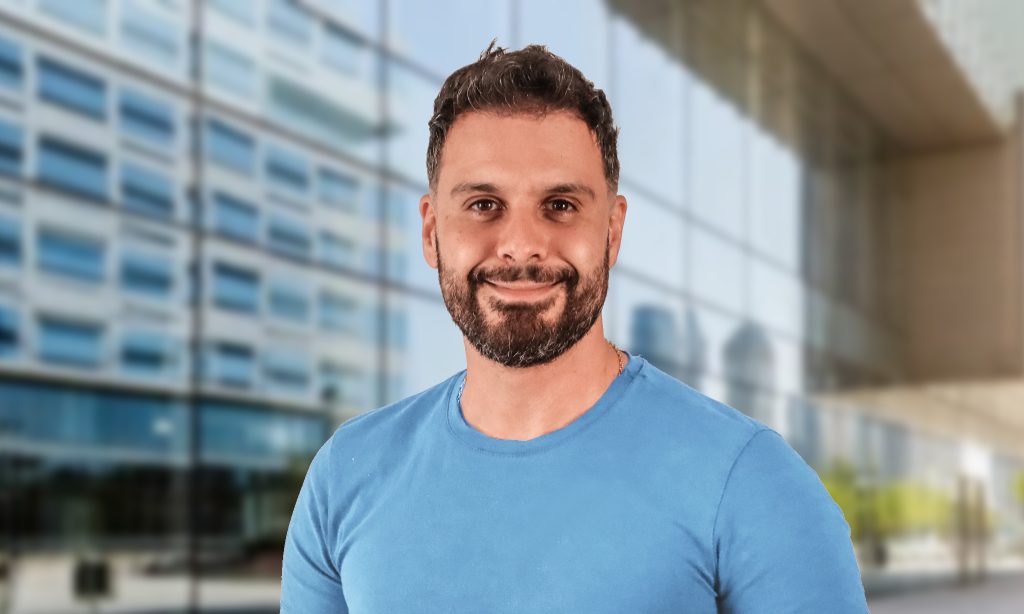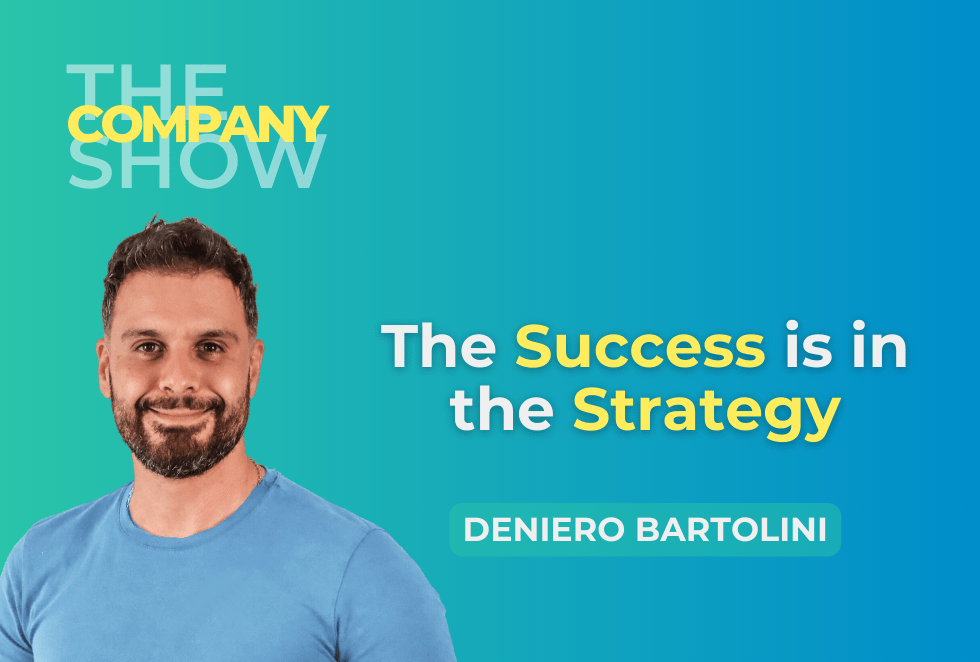There are products and services that don’t require a lot of thought before you buy them — commodities, like toothpaste, shoes, calculators, peaches.
But there are others that require a lot of education before someone has enough understanding to be able to make an informed decision about what exactly the product is and how it might be able to help them if they should choose to buy it.
Now, a podcast can do a lot of heavy lifting when it comes to filling that gap and providing the education and the understanding required for someone to make a buying decision, and it can make tons of other areas of your sales and delivery process a lot easier.
Today, I’ve got a deep dive into a podcast process and optimization strategy for you with Deniero Bartolini, host of The Remote CEO Show podcast. He’s a digital entrepreneur, bestselling author and founder of Remote CEO, a company that helps professional firms scale with remote teams.
Deniero has been podcasting for almost a decade and a half and is incredibly generous with his insights into the different ways that you can leverage a podcast in a business, from providing that critical early information and education to potential clients of high ticket offers, to building trust with new and old clients of any kind of product and increasing your revenue, which is not always easy as a direct line through podcasting, but he’s got some great examples and in case studies of exactly how he has helped clients do that.
Listen to the episode below or continue reading the blog post!
Tune in to the full episode to learn:
- Deniero Bartoloni’s journey from DJing to podcasting
- Indoctrination through podcasting
- Podcasting and the sales cycle
- Balancing solo and interview episodes
- Streamlining podcast production with The Remote CEO
- How metrics and audience goals shape growth
- Podguesting versus hosting
- Finding the right podcast persona
- Signs that you should podcast for your business
My book, Podcasting for Business is coming out this September — learn more about it here.
Deniero Bartoloni’s Evolution from DJing to Business Podcasting

Deniero: “During our sales process, we mentioned that we’ve had a podcast for a very long time. People don’t know that I used to DJ before I opened my online business for 10 years and I started in 2005 and didn’t have a podcast then. But we had a very good breakthrough with our band or duo, we were two people DJing and producing, because we started a podcast.
The idea is that we used to play in Toronto Thursdays, Fridays, Saturdays, and Sunday nights. But we found out that people didn’t really get to know us that well because we were on stage and it was dark and it was late at night. And so we were like, oh boy, how can we kind of like create a fan base?
The idea came to my partner actually back then when we said, why don’t we record a preview of our next week set on Mondays? And then we launched that podcast as a podcast on all the major podcasting platforms and then send those links, that link of that episode to everybody that follows us or people that are online looking for things to do.
We started as it literally is a fun side project because you can imagine people DJing, like we had to practice like any other musician, let’s say, and instead of just practicing by ourselves, we would just press the record button and we’ll have a mini set. And so this mini set would start going out as a podcast. And so
Initially it was just like, hey, here’s what we’re doing. And then we were like, hey, here’s the new songs that came out last week. If you want to listen to the full set, come at Guvernment, Coda, all the big clubs that we had back in that back then in Toronto. And it took off, Megan, it was fantastic.
So obviously, as a natural progression, when I turned entrepreneur, stopped playing in night time and living my life, the first thing that I thought was, Hey, why can’t I transition from making music podcasts to business podcasts?
It just makes so much sense. The equipment was already there. The knowledge was already there. I already loved messing around with software to edit, cut and paste and export MP3, WAV files, and there you go. I just had my first business podcast. Again, just as I had predicted, people started asking questions, we started indoctrinating them, and then the rest is history.”
Indoctrination Through Podcasting
Deniero: “We always say that there is two different types of businesses. There’s businesses that send commodity products. Let’s think this peach that I have right here. This is a fruit and people know what a peach is. They don’t need to be explained what a peach does. They don’t need to know all sorts of things about the peach.”
I was eating a peach because what Megan were saying, I’m very hungry today. So I brought food to the recording session. But the idea, once you have a commodity product, you don’t need to explain everything. You don’t need to explain things. You don’t need to teach them about those things. People just know that they need it, they go buy it.
Now let’s think about the other types of businesses that we work with. These are businesses like consulting businesses, professional firms, anybody that has a software or product that needs to be explained a bit more detail.
Think about how many products actually pick up a client, not from ground zero, but all the way maybe to, let’s say, 50% of their knowledge and take them to, let’s say, 70%, 80%, 90%. What about the bottom 50% though?
For example, for us at The Remote CEO, we teach businesses how to use international talent to scale businesses remotely. Now, we also work with small, small businesses, like solopreneurs. They’ve never even thought about hiring someone.
And so I can’t go to someone that’s never hired someone. I’ll tell them, Hey, we’re going to help you hire four virtual assistants. One’s going to do PR. One’s going to do podcast bookings. One’s going to do this and that.
They’re going to go crazy on that one hour phone call. Chances are they’re never going to buy because in sales, we say that a confused mind never buys. They need to take some time to think about it. So why don’t we answer all their questions in podcast form on a weekly or biweekly basis?
We, again, indoctrinate them, meaning we’re going to show them what our community is all about. And then when they are ready, they’re going to be the ones coming to us asking for either more information, and so they’ll hop on a call, or as if it happens sometimes, quite often, actually, they’re just going to go for the sale. They’ll be like, hey, I saw that you offer A, B, C. I really need A, B. Can we strike a deal with just those two systems? And the answer, obviously, is always yes.
So again, indoctrination is something that we do to teach people what we’re all about, so that when we get on the phone call with them, it’s all about the details, the last details, instead of trying to explain everything from scratch.”
Podcasting and the Sales Cycle

Megan: “We see that a lot in our clients too. When we optimize a show in this way, it’s really for sales cycle length. And then we’ve seen that just exactly what you happen describe again and again, somebody has been listening, maybe even someone you don’t even know is listening, you’ve never heard of them before.
And all of a sudden they get on their phone, they’ve gone through your sales process and they’re like, hey, best friend in the world, I’m so excited to work together, when can we start? So you’re just like, who are you?”
Deniero: “So many times I get on sales calls like we have about 50 triage calls which are the short 15-minute pre-qualification calls and then we have the 1-hour calls. My team takes the 15-minute calls then they get them to us once they’re qualified for the 1-hour call.
You know how many times people get on that call and they’re like, oh, you are the man. You’re the guy that I’ve been listening to for a long time. So you’re right, it feels not only good and it gives you that extra boost and confidence to close the deal. But realistically in a sales cycle, you need to be known, to be trusted, and liked in the podcast. That’s all that for you.”
Balancing Solo and Interview Episodes
Deniero: ”What we have found is that we use and we tell our clients to do solo episodes when they’re doing this indoctrination process because these shorter episodes are all about giving them those tips and tricks that I was telling you about.
Everything else, interviews especially, are there for us to broaden our network, to get to know more entrepreneurs, to possibly get leads, to even show our potential clients that we are very well-connected with the community of podcasters and in general.
Because like I said, we do offer podcasting consulting services. And so it’s good to know that I’ve interviewed more than 450 people. And so for that reason, we keep on interviewing and the good thing about it, Megan, is that we’ve interviewed eight-, nine-figure entrepreneurs and we’re friends with them now.
So people will be like, hey, if you are in Hollywood Hills, just give me a call. Can you even stay for the night or something? And like, I would have never been able to have those types of connections if it wasn’t for The Remote CEO show.”
Megan: “Yeah, I love that. You’re making the relationship building, establishing the thought leadership, increasing your conversions, all of the amazing things that a podcast can bring to you.”
Deniero: “Conversion, that’s the name of the game.”
“As a host, do you prefer interviews or solos?”
Deniero: “Theoretically, I do like solo episodes for that reason. I like to express the way I feel about things. Maybe an article comes out and the first thing that comes to mind is like, hey, I want to comment this article with my audience.
However, I must say that solo episodes tend to be a lot more stressful for me. And the reason is kind of obvious. It’s just like either you write a book yourself or you invite 50 people to help you write different pieces of the book and then you collect them all together. So user-generated content is easier to make, it’s less stressful on your mind because you don’t have to think about it too much.
We have, obviously, a formula that we use for our interviews. I could be on another sales call, then I’m like, okay, bam, go back here, read the notes about the new guests and then ask questions. I’m pretty much used to asking those questions now.
And so to answer in short, I love doing solo episodes, but definitely, I use more of my mental bandwidth. So I try to strike that balance between the two.”
Megan: “We see that a lot with people who are producing. They’ll start off with the podcast-y type of podcast where you’re doing interviews and then all of a sudden they’re out of interviews and they’re, oh no, I have to do a solo.
And everyone thinks it’s going to be really easy before they do it for the first time. And then they do it for the first time and it’s 10 times harder and your first one sounds really weird. “
Streamlining Podcast Production with The Remote CEO

Deniero: “We practice what we preach, basically. The idea is that as a former audio engineer myself, I had the reins of the entire podcasting piece for the first year and a half, like when we had it.
Now, after that, I started hiring people to help me get guests and to then take the raw footage and audio and turn into the actual podcast, so both the guest selection, guest outreach, as well as the editing of the audio and the posting.
Then we started hiring more people to help us get me on other shows. That’s a bit different. Now, we have a person that does podcast bookings, has been trained on how to do that, how to basically run our own podcast booking agency internally. We have someone that does the guest selection and sift through all the applications. And then the same person does the editing and the posting and sends basically the show notes to our guests once they’re up.”
The Hours and Labor Involved
Deniero: “That’s actually something that we have in our course as well in our program. And we generally say that it should take about two and a half times the amount of time of recording time.
Now, obviously it varies greatly. That’s why I’m saying if you have, as an example, one episode a week and it’s a 30-minute episode, you maybe need two and a half times that. So maybe like an hour and 15 minutes, an hour and a half in total to put it all together.
If you have multiple episodes or longer episodes, one way or the other, obviously you would require more time. So the rule of thumb for us is about two and a half to three times the amount of footage or recorded audio that you have on a weekly basis.”
Megan: “That is a very efficient process.”
Deniero: “That’s what I’m going to say. There’s obviously different types of tier podcasts. Like for example, we’re on Riverside right now. You’re saying obviously the quality of the sound and everything else is a tad better than other platforms.
What we have found is because we work with a lot of very busy professional firms, sometimes legal firms with 50 lawyers, and everybody wants like a piece of the pie, they want to be on the shows, whatever. So what we’ve found when we help them is to streamline the process and leave the bare minimum that obviously grants them a good quality podcast without either breaking the bank or complicating their internal processes.”
How Metrics and Audience Goals Shape Growth
Deniero: “First thing I want to mention is what are you looking to get from the podcast? I’m going to give you an example right now. One of our clients is a real estate broker in Toronto and was looking for a way to start a podcast to increase the revenue. And initially it was just interviews, but then we helped them put together a podcast format that greatly increased the revenue, actually almost changed completely their business model.
The first thing that they did was to invite on their show developers. So people that were actually building, companies that were actually building multifamily buildings. They got on the show to talk about those projects, and then they would talk about the different amount of investments that they were looking for for those projects.
So then my client told all the investors that they knew in the area to listen to the podcast on a weekly basis to see if they were interested in any of those projects that were getting developed and they were talking on the show. What he did at that point was to be the middleman between the developers and the investors.
Needless to say, Megan, you can have even just 50 downloads a week with a podcast like this. But if you have the right people, you can make thousands, if not tens of thousands of dollars a week, with just those 50 people.
So my question when people ask me what are the metrics that we’re looking at is first off, who is your audience? So if you’re selling a low ticket item, maybe a course or something that is maybe 200, 300 bucks a month, obviously you may want to have a larger audience and focus on a shotgun approach, so to speak. Try to get as many people. to listen to your podcast and then make money that way.
If you’re looking at as to create a community, same thing. A bigger community, generally speaking, means that you’re going to make more money in the long run. So again, look at the download numbers and the subscribers as one of their primary KPIs.
But if you’re looking for a smaller niche or maybe you’re doing a local podcast in a smaller town or something like that and you’re a lawyer and you’re just looking to get those five to six clients a month, that, again, is not about the big number, it’s about who is listening to your podcast.
I have some of my clients, Megan, that literally put a podcast out, but they don’t care about even almost optimizing it for search. They just send the podcast episodes in their emails to their followers to just make sure that they keep in touch.
Again, someone that has 50 downloads but they’re all seven-figure business owners that may be interested in your services is going to be a lot different than having even a hundred thousand downloads from maybe students that don’t have the money to buy anything from you.
With that said, once you have that idea in mind, my goal is always to have a growth trajectory. So if you’re starting out, it doesn’t matter if you want 50 downloads or 500 or 5,000 downloads per episode, the idea is that you want to consistently get better and slowly, but surely you will start going on that growth trajectory. Once you have the growth trajectory, then you can either figure out how to monetize it or you’re going to scale it up, like I said, with a lot of listeners.”
Megan: “So I love all of this and the strategic way you’re looking at the podcast, not just as a project in and of itself, but it’s a tool that operates within the business for a specific function. Obviously The Company Show, anyone listening, that is what we are all about here. So thank you for those examples.”
What Success Looks Like for The Remote CEO
Deniero: “Absolutely. So obviously we’ve been in a continuous growth. Our episode started with a solo podcast. So I used to get a lot more engagement where people would come back to me and ask questions to me and whatnot. Now we’re getting a bit less questions because what we do is again, mainly interviews. And so we are using our podcast as a way to promote our podcasting booking system.
And so the idea is that we’re looking, yes, at downloads, which could be obviously a very good way to understand how much people are listening to your show, but also when people come in into our funnel, where are they coming from? And so we always ask, where did you come from? Did you come from our, we do, let’s say cold email outreach, Facebook ads, podcasting.
And so if we have a good 20-30% of our leads coming from our podcast or having us found through our podcast, we know that we’re doing a good job, which means that’s bringing in 30% of the revenue.”
Podguesting Versus Hosting
Megan: “As a podcast guest, which you also do a lot of, how does your guesting compare to your hosting when it comes to the impact that you’re seeing in your business, either yourself or a great example you’d like to share?”
Deniero: “So like I said, as a host and an interviewer, I find that I’m not getting as much clout as I used to when I used to do my solo episodes. People don’t get to know my true personality, so to speak, when I just ask questions. And so I like it, but it’s obviously not as good as being a guest.
Now, we found that a lot of times that I go on podcasts, we get inquiries and people already know everything, not everything, but they know me a bit better, because I talked about the business, they can hear my voice and maybe like me or not like me. They don’t like me, probably they won’t contact me.
Generally speaking, I get, hey, I like your energy. So we do get a lot of feedback based on that and I absolutely love it because at the end of the day, even if we do B2B business to business, it’s still P2P people to people.
If I am a business owner, I want to work with another business owner that I have a good chemistry with. And so podcast guesting has been helping me do exactly that, find out who is a good fit. And then when we find each other, we attract each other and possibly start working together.”
The Most Interesting Question Deniero Got as a Guest
Deniero: “My story is a bit different because I was born and raised in Italy, then I lived in Canada as a dual citizen for a long time from Canadian father, then I moved back to Italy. Now we’re doing six months and six months.
So a lot of times, people kind of try to figure out how I operate my business and I find it very interesting to explain how true remote business can operate in almost basically like 24 different time zones now.
So that is a very intricate question that sometimes I really like to answer because it forces me to distill the information in a 90-second answer and then I generally use these answers even on my sales calls. And so I use my guesting as a training ground for new ways of expressing what we do. That said, I think that you also asked a very interesting question about how we started podcasting and way back to when I used to play techno at 4:00 A.M.”
Megan: “You know what? I’ve never lived in Toronto, but I bet a number of my cousins may have attended your shows.”
Deniero: “Gosh, if they are between 30 and 45, they probably are.”
Megan: “Entirely possible. That’s delightful. Let’s move on a little bit to who should be podcasting? Because podcasting, even when you’ve got a great team to help and they take a lot of the work off and they make it very easy, it’s still an investment of time and there’s a lot of work that’s involved in it.”
Signs That You Should Podcast for Your Business

Deniero: “There’s three things and I want to actually mention them real quick before I forget them and I’m going to break down all of them. So first one, like I said, business model, second one is your own personality as a leader in your business, and third of all is the timing.
So let’s start from business model. We mentioned the harder it is for possible clients to understand what you do, the faster you need to start podcasting so that you can really break that down for them. So one, business model.
Second of all, your own character. Now, let me give you an example. I’m not going to mention what companies I used to work with but back in the day, but I used to work for a pretty decent startup in Toronto back, I don’t know, 15 years ago. The CEO was the most boring person I’ve ever met in my life. I’m sorry. That’s why I’m not mentioning the name of the podcast. That person like me could not put three words together without people falling asleep.
So in that case, what I would suggest is if you know yourself, take a good hard look and be like, maybe it’s not me, maybe I’m going to send my CMO on different shows. Maybe I’m going to start sending someone else. But again, if the business model calls for it, do find a way for someone with charisma to go on shows to talk about your product.
Third of all, we said timing. You mentioned it. I also really mentioned how timing is important. Now, if you are in need of leads right away, figure out to get leads right away. Go and fix your funnel, go and look for direct marketing approaches that are shorter time span for getting those leads.
We offer five brand building services in our business, two of them are podcast launch and podcast bookings, then we have SEO, social media management, blah, blah, blah. Then we have one only direct marketing tool, which is cold email outreach.
When people come to me and they say, I want to start a podcast or I want to be a guest on a podcast, and then I ask them, okay, like, do you have leads? And they were like, well, we’re struggling with leads. Wait a second, let’s fix that first.
Because like you were saying Megan before, this is all about brand building. Brand building is like vitamins. You don’t just take a vitamin C tab and then you’re going to be like, oh, I feel great. You got to take that stuff for like two, three, four months before you’re going to be like, oh, my life is completely different.
Podcasting is just like that. It’s just like SEO, it’s just like other tools that allow you to build that brand so that when your actual phone calls are coming in, instead of closing only 10-15% of them, you’re going to close 30-40%.
Going back to timing, if your timing right now is I need leads, fix that problem first. If your problem is hey, I have leads but I can’t close them or I have some leads. I would like to increase them in the long run, then podcasting, you should have started it last week. The second best time is now.”
Megan: “I love that. I’ve got to say that I’ve got such a soft spot for boring podcasts because I just love a podcast that is created by nerds who are just so into the thing that they’re into. The more boring and like the more precise and the more niche, but I just can’t get enough of them. I think they’re so great.”
Deniero: “It’s like AM radio at 2:00 A.M.”
Megan: “Exactly. Someone’s going to be doing that and they’ve just got this unbelievable passion for their topic, even if they maybe are not the most charismatic. I just have such warm feelings.”
Finding the Right Podcast Persona
Deniero: “So going back to the charisma, charisma is one thing. One thing is also being able to explain what you want to do or what you want to teach in a way that’s understandable. So charisma, you’re right, you can be non-charismatic but very eloquent and you’re able to explain things, even if it’s quite “boring”, but you’re still getting the point across.
What I am saying is if you’re a person that’s going to sit there and like have more ums and ahs than actual content because you don’t even like to talk to your own team, maybe there’s someone else in your team that can explain it better and it also frees up your schedule. If you’re a busy CEO, maybe you do want your marketing team to take care of the podcast.”
Megan: “Yeah, very much so. We haven’t talked about there’s kind of two kinds of charisma that can work as a podcast, just as the rock star and the wingman. A rock star, I think you’re a rock star. You shine, you’re comfortable in the spotlight and you’ve got great things to say, you bring that energy.
And then there’s the wingman type and they are much more comfortable shining the spotlight. They do so well as interview-style hosts because they thrive on making other people look good. You can learn to be a wingman, but you can’t really learn to be a rock star. You have to be born with that. There’s room for everything.
Thank you so much for joining me, for being so generous with your strategies and sharing all of these great examples. I’ve taken a whole bunch of notes. I think we’re really approaching podcasting from similar ways, which is always a treat to talk shop with someone in that regard.”
Connect with Deniero Bartolini

Deniero: “Everybody can find me at denierob.com — book, podcasts, and everything else.
If you are a solopreneur looking to scale up with a remote team, or you are an existing business owner that has maybe a team of 10, 15 people, but you also want to build a hybrid team, then also reach out to us because we have some great stuff that we want to share with you.”
Website | LinkedIn | Instagram | The Remote CEO Show
Final Thoughts
I love the precision of the strategies Deniero shared and how by thinking about the end users of a particular business — not only your clients themselves, but thinking about the people they want access to and information about and how you can make sure that they’re getting that information and acting as an intermediary between important parties in a transaction.
Doing this kind of thinking can lead to some really fascinating show concepts. And when you do start thinking outside the box a little bit and thinking about what your business really needs and what your clients really need, who they really need access to and who wants access to them, you can get some really interesting ideas going for your show and develop something that’s going to make a massive difference in your business, whether or not it ever gets tens of thousands of downloads.
If you want to design your own podcast that makes a real impact on your business, then you need to start with the strategy. Our framework, what we use at One Stone Creative, the Business Podcast Blueprints, they help you design a show that adds real value to your business in excruciating detail.
Our framework, the Business Podcast Blueprints, is what we use to help design podcasts that add real value to businesses, the kind that you can measure with real math. And I’m sharing it all in absolutely excruciating detail in my new book, Podcasting for Business, which is releasing September 10th of this year.
It is currently available for pre-order, and if you get yourself a copy on or before September 10th, you’re going to be entitled to a free ticket to the Podcasting for Business Conference 2024.
Get all of the details here.
Be A Guest on The Company Show
Do you have a podcast that’s making a major difference in your business or know one that is? Fill out this contact form and let us know about it.
We’d love to have you here for an episode like this one!
Need A Podcast?
As always, this is Megan Dougherty, and The Company Show was made possible by the team at One Stone Creative.
If you know a business owner that you think should have a podcast, do us a favor and send them to podcastingforbusiness.com!
Key Quotes
“A confused mind never buys.” – Deniero Bartolini
Resources
One Stone Creative | LinkedIn | Twitter | Facebook | Instagram
- Pre-order the book, Podcasting for Business
- Pre-ordering will get you a free ticket to PFBCon 2024
Learn about what other business podcasters are doing:
Deniero Bartolini | Website | LinkedIn | Instagram | The Remote CEO Show

